from Robinson Crusoe and Thrift Stamps
by Ellis Parker Butler
When I was a small boy I learned a rhyme that went like this:
Poor old Robinson Crusoe!
Poor old Robinson Crusoe!
He made him a coat
of an old Nanny goat;
I wonder how he could do so?
I don't believe I lay awake at night trying to figure out how he was able to make a perfectly good coat out of an old nanny goat,
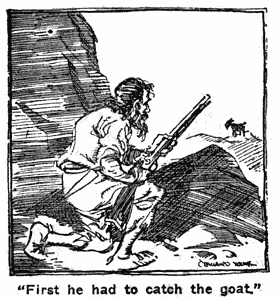 but I am sure of one thing --- first he had to catch the goat. Probably he went out and shot it. Then he had to skin the goat and tan the skin and cut it properly and sew the pieces into a coat, and thus he had a perfectly good coat, and, I judge by the pictures I have seen he had enough goat skin left over to make a hat. All this took a great deal of time -- weeks, I suppose. That did not matter much to Robinson Crusoe because he was on a desert island and could not get off and he had all the time there was. He just took what time he needed and kept at the job until the coat was made. It was the very best thing for him to do, because he was in rags and tatters and there was no shop on the island that sold coats or anything else. He was all alone there so he shot the goat and made the coat and put the coat on and was comfortable in it.
but I am sure of one thing --- first he had to catch the goat. Probably he went out and shot it. Then he had to skin the goat and tan the skin and cut it properly and sew the pieces into a coat, and thus he had a perfectly good coat, and, I judge by the pictures I have seen he had enough goat skin left over to make a hat. All this took a great deal of time -- weeks, I suppose. That did not matter much to Robinson Crusoe because he was on a desert island and could not get off and he had all the time there was. He just took what time he needed and kept at the job until the coat was made. It was the very best thing for him to do, because he was in rags and tatters and there was no shop on the island that sold coats or anything else. He was all alone there so he shot the goat and made the coat and put the coat on and was comfortable in it.
There is one thing I am sure of, however. If Robinson Crusoe had spent all his time making chocolate creams or chewing gum or other unimportant things, he would never have had time to go hunting that old nanny goat or time to make the coat after he shot the goat. He would have had chocolate creams and chewing gum that he did not need, and he would not have had a coat he needed very badly.
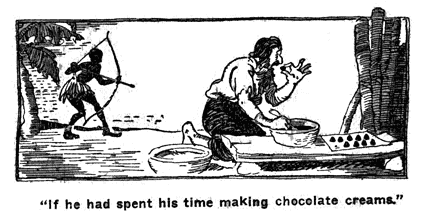
CRUSOE GOT HIS GOAT
There is one good thing about a goat skin coat, homemade, with the hairy side out. It is tough. An arrow will hardly pierce it. So when Robinson Crusoe had his coat made and got into it he was less afraid of the arrows of any savages who might happen to land on his island. With his rifle in his hand he was ready to go out and fight the savages when he had his coat on, but without the coat he would have had to hide his naked self in some cave, and if an arrow hit him it would have killed him. So if he had spent his time making chocolate creams or chewing gum or other unnecessary things instead of a coat, he might have paid his life for his foolishness.
Now, it is an odd thing that Daniel Defoe, who wrote this story about Robinson Crusoe and who knew all about shipwrecked men, was the first man in the world to suggest savings banks. That was in 1697, 220 years ago. It may be that one reason he thought banks, where children and others could put their money to save it, would be a good thing was because he knew how little use money was to a man shipwrecked on an island, If anyone had landed on Robinson Crusoe's island and had offered him $1,000 for his goat skin coat Robinson Crusoe would have laughed at him. Money meant nothing at all to him. He could not buy anything with it because there was no one on the island to buy anything from. When Crusoe found the gold and "pieces of eight" in the wreck, he was disappointed. "As to the money," he wrote, "I had no manner of occasion for it. It was to me as the dust under my feet, and I would have given it all for three or four pair of English shoes and stockings." There were just two things that were of any use to him -- goods and services. By goods are meant things he could use, such as his coat and his rifle; by services are meant help of one sort or another, such as the work of some one to sew a coat or plant potatoes, or shoot goats for their skins. Services such as these were of value to Robinson Crusoe, and so were goods; such as the coat he made and the potatoes he raised, but silver dollars and quarters and dimes were nothing but circular pieces of metal that would get lost in the sand and be of no use to anybody.
DEFOE KNEW MONEY'S FUNCTION
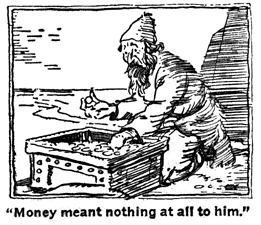
So doubtless Daniel Defoe saw the truth, which is that money is of no use for itself, but only because it can make other people supply goods and services for it. He thought: "What is the use of children and others hoarding up money in old socks and bags? It does them no good there. If they put it in a savings bank the bank can lend it to some one who will buy goods and services with it and their money will be working. Then when whoever put it in the bank wants it back, the bank will return it and a little more, and every one will be better off." So savings banks were started.
Now, Robinson Crusoe, when he made himself a goat skin coat instead of making chocolate creams and chewing gum, was a wise man. But suppose he was rescued from the island, as he was at last, and came here to the United States to live, and the United States was at war with Germany. Robinson Crusoe would, of course, get a job somewhere, because he might be too old to fight. There would be two kinds of jobs he could get; he could go to work making rifles or clothing, or food or other things that would help win the war, or he could get a job making chocolate creams or chewing gum, or things that will not help win the war. There are so many children buying chocolate creams and chewing gum and other things that are not absolutely necessary that he would probably get a job making one of those things. He would not care as long as he was paid for doing the work -- for supplying his services -- what kind of goods he was making, chocolate cream or rifle bullets would be all the same to poor old Robinson Crusoe, just as it is all the same to other men who sell their services to make goods.
Robinson Crusoe would not care, but, as the war went on, the United States government that is trying to win the war would care. It would wish with all its heart that Robinson Crusoe would stop making chocolate creams that children can live without (if they try) and go to making cartridges or clothing for our soldiers and sailors, to help win the war. But Robinson Crusoe would go right ahead making chocolate creams or other unnecessary things because the children were buying them. So there we would be: children spending their pennies and nickels and dimes for things they might easily do without, and Robinson Crusoe so busy making them that he would have no time to make cartridges and clothing, and -- as like as not -- Germany would win the war because Robinson Crusoe and thousands of other workers were doing the wrong kind of work.
THRIFT STAMPS HELP THREE WAYS
Right here is where the Thrift Stamps come in and help win the war. Our government prints a lot of Thrift Stamps because "thrift" means "savings" and the government wants people to "save" the money they spend for Thrift Stamps. It suggests that children and grown folks do without chocolate creams and things that are unnecessary and save the pennies and dimes until they have enough to buy Thrift Stamps.
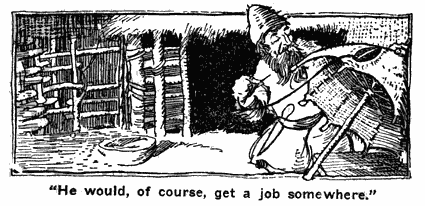
Then what happens? It is very interesting.
When whoever is buying Thrift Stamps has sixteen of them -- four dollars' worth -- he takes them with a few pennies more (say twelve cents) to a post office and gets a War Savings Stamp for them.
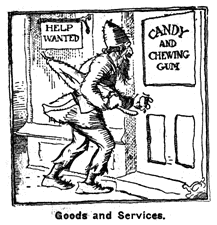 The government pays compound interest on the War Savings Stamps, just as savings banks pay on money deposited. So for the $4.12 the child or grown person has saved the government will pay back, on January 1, 1923, not $4.12, but $5.00. That is worth while, but that is not the biggest thing of all. The biggest thing is this: When you start saving your pennies and nickels and dimes and no longer spend them for chocolate creams and other unnecessary things, Robinson Crusoe does not have to make those unnecessary things. His services are not needed to make unnecessary goods, and he can go to work for our government, or in other factories making things that will help win the war. And you see where the government will get the money to pay him? It will be the very same money you would have spent for chocolate creams or other things! The reason is that when you buy a Thrift Stamp you are lending your money to the government. When you don't buy chocolate creams (or so forth) and do buy a Thrift Stamp with your 25c, you let Robinson Crusoe stop making chocolate creams and you give the government 25c to hire him (or buy his services) to make goods that will help win the war, So you are helping in three ways! First, you let Robinson Crusoe get away from making goods that are unnecessary; second, you lend money to the government to buy the goods and services it needs, and third, your money goes to pay Robinson Crusoe in his new job of helping our government win the war! That is a great deal for a little money to do, but it does it!
The government pays compound interest on the War Savings Stamps, just as savings banks pay on money deposited. So for the $4.12 the child or grown person has saved the government will pay back, on January 1, 1923, not $4.12, but $5.00. That is worth while, but that is not the biggest thing of all. The biggest thing is this: When you start saving your pennies and nickels and dimes and no longer spend them for chocolate creams and other unnecessary things, Robinson Crusoe does not have to make those unnecessary things. His services are not needed to make unnecessary goods, and he can go to work for our government, or in other factories making things that will help win the war. And you see where the government will get the money to pay him? It will be the very same money you would have spent for chocolate creams or other things! The reason is that when you buy a Thrift Stamp you are lending your money to the government. When you don't buy chocolate creams (or so forth) and do buy a Thrift Stamp with your 25c, you let Robinson Crusoe stop making chocolate creams and you give the government 25c to hire him (or buy his services) to make goods that will help win the war, So you are helping in three ways! First, you let Robinson Crusoe get away from making goods that are unnecessary; second, you lend money to the government to buy the goods and services it needs, and third, your money goes to pay Robinson Crusoe in his new job of helping our government win the war! That is a great deal for a little money to do, but it does it!
And besides these three things there is a fourth; you are saving your money and putting it where it will earn money for you while you are awake and while you sleep! So I suggest a new rhyme to add to the old one about Robinson Crusoe:
Good old Robinson Crusoe!
Good old Robinson Crusoe!
The Thrift Stamps he bought
Won the war that we fought,
And we all saved and helped him to do so.